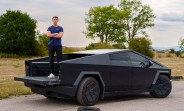Electric car sales overtake gasoline and diesel in Europe, Tesla misses momentum
The latest sales data from the European Union suggests that October 2025 was a turning point in the continent's automotive landscape, with sales of new gasoline-powered vehicles falling sharply and for the first time giving up the market lead.
New car registrations in the EU saw a rather modest year-to-date increase of just 1.4% through the first ten months of this year. But hidden within that small rise is a huge shift in consumer preference toward electric models and their hybrid cousins.
The combined forces of battery-electric, plug-in hybrid, and standard hybrid models accounted for roughly 63.9% of all new car registrations in October - a jump from 55.4% just one year earlier. The standard hybrid-electric vehicle remains the most popular choice for EU consumers. These cars captured 34.6% of the market share year-to-date, with registrations hitting 3,109,362 units in the first ten months of 2025.

This segment is growing very quickly, with key markets like Spain and France leading the charge, posting registration gains of 27.1% and 26.3%, respectively. This shows that many drivers are opting for a stepping stone away from pure gasoline power.
European buyers registered 1,473,447 new BEVs between January and October 2025, giving electric cars a 16.4% market share year-to-date - a decent boost from 13.2% in 2024. In October alone, BEV registrations went up by 38.6% compared to the same month last year. The four largest EU markets account for 62% of these new electric registrations, with Germany showing tremendous strength, reporting a 39.4% increase in sales of electric cars for the year so far.
The data also points to an impressive resurgence for Plug-in Hybrid EVs. These models recorded the strongest growth rate of any segment in October, jumping 43.2% year-over-year. PHEV registrations grew to 819,201 units through October, resulting in a 9.1% market share. The segment saw massive triple-digit growth in Southern Europe, with Spain's PHEV registrations skyrocketing by 109.6% and Italy's rising by 76.5% for the year-to-date.

The electric and hybrid vehicles seem to prosper at the expense of the traditional combustion engines. The combined market share for petrol and diesel cars dropped to just 36.6% year-to-date, down from 46.3% during the same period last year. Diesel cars, once a staple of European driving, saw their market share fall below 10%, with a 24.5% drop in registrations for the first ten months of 2025. Petrol cars fared little better, falling 18.3% for the year, with registrations totaling 2,459,151 units.
Every major EU market saw a decrease in petrol sales, led by France with a staggering 32.3% decrease and Germany with a 22.5% drop. The numbers make it clear: the era of fossil fuels ruling the new car market is effectively over.
The Volkswagen Group, including brands like Volkswagen, Skoda, and Audi, continues to hold its position as the leading carmaker in Europe. On the electrification front, Chinese manufacturers like BYD reported an astounding 206.8% surge in sales during October, while SAIC Motor also saw a climb of 35.9%.

The US-based EV leader Tesla was the only automaker to experience a steep 48.5% drop in sales volume for the month - it seems the vehicle updates weren't enough to distract the buyers from Tesla CEO's antics, and after a short burst of interest, the sales continued a falling trend.
But it was the Dacia Sandero that claimed the title of best-selling car model in Europe for both October and the year-to-date period, proving that affordable, smaller vehicles still have mass appeal, regardless of their power source. The data confirms the shift is structural and permanent, with most consumers moving toward EVs or hybrid solutions, even if the overall market volume has not fully returned to pre-pandemic levels.





Facebook
Twitter
Instagram
RSS
Settings
Log in I forgot my password Sign up